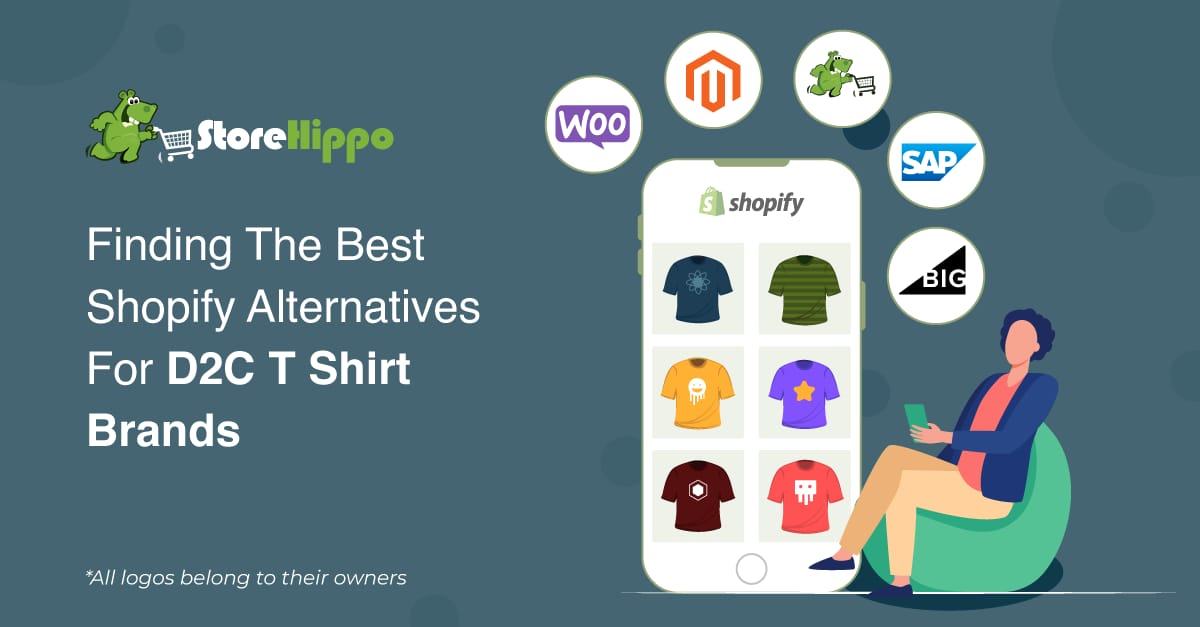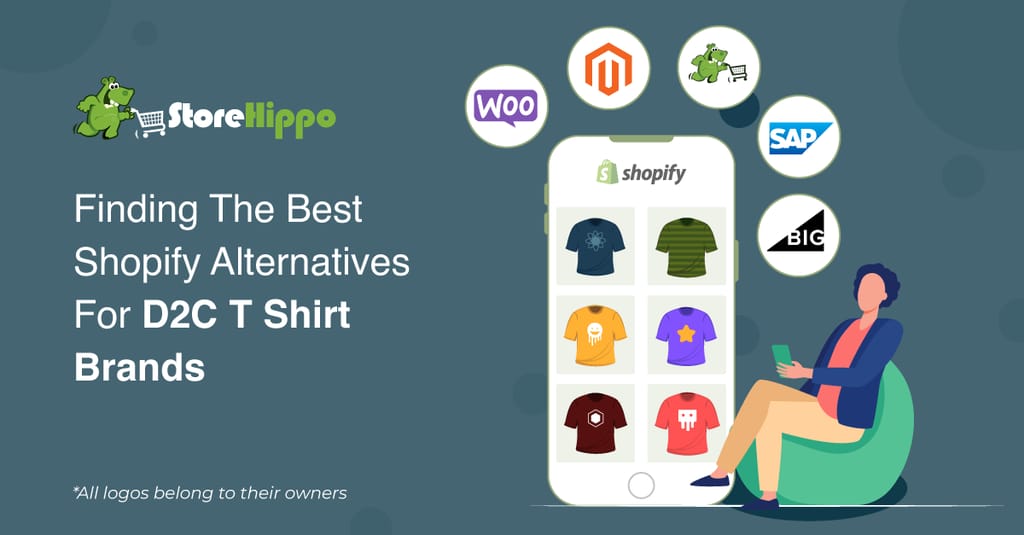The direct-to-consumer model has completely transformed the fashion and apparel industry, with brands like Bewakoof setting trends in online sales of casual wear and t-shirts. The Indian D2C market is flourishing, with fashion eCommerce growing at an impressive 51% annually and the T shirt segment accounting for $5.1 billion in 2024 (Source: Statista). As more consumers prefer shopping directly from their favorite brands, brands need to select the right eCommerce platform for building their D2C website to ensure long-term success.
While Shopify is a popular option, several D2C Shopify alternatives come with unique features designed to help fashion brands like Bewakoof grow and scale efficiently.
Table of Contents
Non-Negotiable Features of a Shopify Alternative Platform for a D2C T-Shirt Brand
Creating a successful direct-to-consumer t-shirt brand requires more than just eye-catching designs and quality products. To scale and compete in today’s dynamic fashion industry, your eCommerce platform must offer specialized features that cater to the unique demands of a fashion-forward D2C brand.
The right D2C Shopify alternative platform should empower your t-shirt business to innovate, expand, and connect with your customers seamlessly. Let’s explore the must-have features your D2C t-shirt website needs to thrive in a competitive landscape.
- Customizable Storefronts
Your platform should offer customizable themes and storefront designs to help your brand stand out in the crowded online fashion space. Look for platforms that enable effortless customization of your storefront to showcase your latest collections, seasonal campaigns, and brand identity.
- Scalability to Handle Growth
As your brand gains popularity, especially with viral tshirt designs, your D2C Shopify alternative platform needs to handle high volumes of traffic and rapid growth without compromising performance.
- Mobile Commerce Solutions
Mobile shopping is critical for fashion brands, especially in the t-shirt industry, where younger, trend-conscious consumers predominantly shop via smartphones. Your eCommerce platform must provide a seamless shopping experience across mobile devices, including responsive websites and mobile apps.
- Personalization and Customization Tools
Personalization is a key driver in the D2C t-shirt market. Your Shopify alternative platform should offer personalised buyer journeys to your customers by supporting preferred language, payment options, logistics and more.
- Omnichannel Integration for Unified Experiences
A modern D2C apparel brand requires a unified shopping experience across all touchpoints, from online stores to pop-up events and social media channels. Your Shopify alternative platform must support omnichannel sales by seamlessly integrating with offline channels, marketplaces, and social platforms along with any commerce enabled channels.
- Third-Party Integrations for Streamlined Operations
To streamline your business operations, choose a platform that offers seamless third-party integrations. From payment gateways to logistics partners and marketing and accounting tools, your D2C Shopify alternative platform should support integrations with essential tools and services that ensure smooth order processing, shipping, and delivery.
- Comprehensive Analytics and Reporting
In the fast-paced t shirt industry, data-driven decisions are key to staying competitive. Your platform should provide detailed analytics and reporting tools to give you insights into your customers’ shopping behavior, product performance, and overall sales trends. A robust analytics dashboard allows you to identify best-selling products, optimize marketing campaigns, and make informed business decisions.
The best Shopify alternative for your D2C t-shirt business should have these critical features to help your brand grow, scale, and stay competitive in the fast-moving fashion industry.
Top 5 Shopify Alternatives for Building a D2C T Shirt Website
To build a successful direct-to-customer brand your business needs to be powered by an ecommerce platform that fulfills your business’ present and future needs. If you have been considering migration due to the complexities and limited nature of Shopify, there are competitors that can help you grow your business.
Let's dive into five Shopify competitors that are perfect for launching and expanding your D2C business, especially if you're focusing on trendy products like t-shirts.
1. StoreHippo
.png)
StoreHippo is an excellent Shopify alternative for D2C t-shirt brands, offering advanced features that support fast growth and scalability. With its mobile-first architecture and progressive web apps (PWAs), StoreHippo ensures a smooth shopping experience across devices—a crucial aspect for today’s mobile-savvy customers. Tailored for medium and large D2C brands, StoreHippo provides ready-to-use solutions that enable quick market entry and the agility to adapt to evolving consumer needs. The platform allows you to effortlessly create multi-vendor marketplaces, multi-store networks, or multilingual websites with support for multi-currency payments.
Pros:
- Fully managed D2C eCommerce platform with automatic updates, ensuring smooth and hassle-free operations.
- Highly flexible framework, allowing seamless customization of both the frontend and backend.
- Scalable solution built to handle high traffic and support business expansion without performance issues.
- Built-in mobile app builder lets you create Android and iOS apps for your t-shirt brand without coding, at no extra cost.
- Supports over 100+ languages, enabling you to connect with customers in their native languages.
- User-friendly drag-and-drop interface for designing unique, custom themes for your D2C t-shirt store.
- White-label solutions tailored for enterprise D2C t-shirt brands.
- Comprehensive multi-layer security with free SSL and PCI-DSS compliance.
- Omnichannel capabilities allowing multiple customer touchpoints with unified backend management.
- SEO-friendly platform with a suite of marketing tools, making it one of the top D2c Shopify alternatives for apparel brands.
- Over 300+ built-in features, eliminating the need for external paid apps or plugins.
- 120+ pre-integrations and seamless API connections to preferred tools.
- 60+ pre-integrated payment gateways for domestic and international payments.
- 30+ logistics partners for seamless nationwide shipping.
Cons:
- Advanced features and extensive customizations are available in higher-tier plans.
- While ideal for high-volume stores, POS integration is limited to third-party solutions, with no proprietary POS system.
- Does not offer marketing services, despite high demand from clients.
2. BigCommerce
.png)
BigCommerce is an ecommerce platform known for its scalability and flexibility, which position it as a strong D2C Shopify alternative for growing t-shirt brands. With a wide array of inbuilt features, it helps fashion brands streamline operations, manage inventory, and expand into international markets. For businesses seeking a reliable Shopify alternative, BigCommerce offers a robust solution with many advantages.
Pros:
- No transaction fees, allowing you to keep more of your profit margins.
- Seamless omnichannel integrations with platforms like Amazon, eBay, and social media, enhancing reach.
- Advanced SEO tools to boost online visibility and drive more organic traffic.
- Strong support for international sales through multilingual and multi-currency features, enabling global expansion.
- Extensive built-in features that cater to fashion brands, helping them scale efficiently.
Cons:
- Higher-tier plans are required to unlock advanced features, which may increase costs for smaller businesses.
- Limited design flexibility compared to other platforms like StoreHippo and Magento, restricting customization.
- App marketplace isn’t as extensive as Shopify’s, potentially limiting integration options for niche functionalities.
- Learning curve for beginners due to the number of inbuilt tools and settings.
- Less intuitive storefront customization compared to some competitors, making it harder for non-developers to create unique designs.
3. Magento (Adobe Commerce)
.png)
Magento (Adobe Commerce) is a powerful platform offering unmatched customization, making it an excellent D2C Shopify alternative for t-shirt brands looking to create a unique shopping experience. With its open-source architecture, Magento allows complete control over every aspect of your store, from product displays to the customer journey, making it a top choice for brands with complex requirements.
Pros:
- Open-source architecture enables deep customization of your t-shirt website, allowing you to tailor everything from the layout to advanced features.
- Scalable solution for large D2C brands, handling high traffic and complex operations with ease.
- Large developer community provides access to countless extensions and plugins, offering flexibility and added functionalities for your store.
- Built-in support for multiple storefronts, languages, and currencies, making it ideal for brands with global ambitions.
- Advanced inventory management features, allowing seamless control over stock across multiple locations and channels.
Cons:
- Requires significant technical expertise, necessitating a dedicated development team for setup, customization, and ongoing maintenance.
- Higher setup and operational costs compared to plug-and-play platforms, which may be a barrier for smaller brands.
- Slower time to launch, as customizations and extensions often take longer to implement compared to more user-friendly platforms like StoreHippo.
- Regular updates and patches require careful management, which can increase ongoing maintenance costs of your D2C website.
- Performance issues can arise if not optimized properly, especially for larger catalogs or traffic spikes.
4. WooCommerce
.png)
WooCommerce, a popular WordPress plugin, serves as an excellent Shopify alternative for small to medium-sized t-shirt businesses. If you already have a WordPress site, WooCommerce allows you to easily convert it into a fully functional D2C website, offering flexibility and affordability.
Pros:
- Low-cost setup with extensive flexibility through a wide range of free and paid plugins, making it budget-friendly for small businesses.
- Seamless integration with WordPress, perfect for content-heavy websites or blogs that require both eCommerce functionality and content management.
- Customizable themes and easy-to-use product management tools, enabling businesses to create a personalized shopping experience without extensive coding knowledge.
- Control over hosting and security by choosing your own web host and managing updates make it a good D2C Shopify alternative for brands with .
- Access to a vast plugin ecosystem, allowing for the addition of advanced features as your business grows.
Cons:
- Limited scalability, making it less suitable for larger businesses with high traffic or complex needs compared to other Shopify alternatives like StoreHippo.
- Reliance on third-party plugins, which can introduce security vulnerabilities, increase maintenance needs, and lead to performance issues.
- More complex setup than all-in-one platforms, requiring additional plugins and configuration for key functionalities like payments and shipping.
- No built-in multi-vendor marketplace support, making it difficult for businesses looking to expand into marketplace operations.
- Performance issues may arise without proper optimization, especially as the store grows and traffic increases.
5. Shift4Shop

Shift4Shop provides an all-in-one solution with robust marketing and SEO features, positioning it as a strong D2C Shopify alternative for t-shirt brands looking to enhance online sales and customer engagement. With affordable pricing and essential tools, it is particularly suited for startups aiming to build a D2C website that attracts and converts customers effectively.
Pros:
- Built-in marketing and SEO tools help drive traffic and boost conversion rates, making it easier to attract and retain customers.
- No transaction fees, reducing operational costs and improving profit margins for t-shirt businesses.
- Mobile-responsive templates and product customization options, which are ideal for creating a unique and user-friendly D2C website.
- Subscription and recurring billing options, perfect for offering subscription-based products like t-shirt-of-the-month clubs.
- Affordable pricing, making it accessible for startups and small businesses looking to grow without high upfront costs.
Cons:
- Limited design customization compared to more flexible platforms like Magento or StoreHippo, which may hinder creating a highly unique storefront.
- Smaller app marketplace, which can restrict advanced functionality as your brand scales and requires more specific features.
- Less extensive multi-vendor capabilities, making it harder for businesses looking to expand into marketplace models.
- Customization may require developer input, adding complexity for non-technical users compared to plug-and-play solutions.
- Less frequent updates to the platform compared to leading Shopify alternatives, potentially limiting access to the latest features and enhancements.
Conclusion
The D2C t-shirt market is booming, with brands like Bewakoof setting the standard for success in this highly competitive space. Choosing the right eCommerce platform is critical to building a scalable, engaging, and future-ready online presence. While there are several Shopify alternatives with unique features designed to help you build a strong D2C website, it’s essential to select one that aligns with your brand's growth trajectory and evolving needs.
For ambitious D2C t-shirt brands looking to replicate the success of Bewakoof, StoreHippo stands out as the best D2C Shopify alternative. With its mobile-first design, headless commerce capabilities, and robust multi-vendor and multi-channel features, StoreHippo ensures your brand is equipped to handle future growth, reach new markets, and engage customers across touchpoints seamlessly.
By choosing a Shopify alternative that supports your long-term goals, your D2C t-shirt brand can thrive in the fast-paced eCommerce landscape. Ready to elevate your D2C t-shirt brand with a superior Shopify alternative? Explore StoreHippo’s enterprise eCommerce solutions and start your 14-day free trial today.





















Leave A Comment